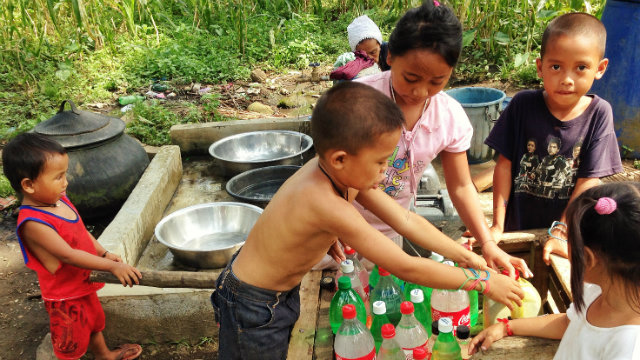SUMMARY
This is AI generated summarization, which may have errors. For context, always refer to the full article.
ARAKAN, North Cotabato – Normelita Apura knows the value of water.
3 years ago, she lost her 14-year-old son who was fetching water from the neighboring village of Meocan in Arakan, North Cotabato.
Meocan is some two kilometers of rough and mostly-steep roads away from Normelita’s home in the village of Ganatan. Her son, Delfin, was in an owner-type jeep traveling to get water in Meocan when the vehicle fell on a ravine.
“He died while getting water,” she said.
Today, every time she opens the faucet in her home, Normelita is reminded of her son.
Waterless
Ganatan was thrice a beneficiary of water system projects implemented by non-governmental organizations (NGOs). These projects, however, failed as residents did not see their value – some even cut pipes and used these as improvised torches at night.
Until ACF International arrived in 2010. Oscar Cui, engineer for ACF’s Water, Sanitation and Hygiene (WASH) project, said it was really difficult for them to convince people “to be serious” about another water system project.
For a year, ACF held meetings on sanitation with residents. “We showed them how important water is for sanitation,” Cui said of the one-year “social preparation.”
To make residents stakeholders in the project, they were tapped to dig the soil and bury the pipes – at least 13 kilometers long from the water source to the village center. But a few villagers wanted a direct pipeline to their households. Village head Valentino Camino, however, demonstrated political will, giving stern orders that the project was supposed to be for communal use.
“That’s when the people realized that we were serious, and that they have to be serious about it,” Cui added.
And while residents were building tap stands and burying pipes, Normelita’s son died. That incident made even more firm the residents’ resolve to work on their water system.
After two years of enjoying easy access to water, the residents of Ganatan wanted more water in their homes.
Roel Palmes, treasurer of the village’s Barangay Water and Sanitation Association (Bawasa), said they started installing individual water connections in homes in 2013. Of Ganatan’s 300 households, a total of 110 homes now have direct access to water – a faucet in their own sink.
With water within their reach, residents started building toilets. This is a 180-degree turn from what they did before – open defecation.
Roel recounted the time when visitors came to still-without-toilets Ganatan. “They would go somewhere else to answer the call of nature,” he said. “Today, residents are not ashamed to offer their toilets.”
Livelihood
But water and latrines were not the only things brought to Ganatan. AFC also implemented livelihood and income-generating projects.
Leny Oyao, a wife of a farmer, received corn, palay and vegetable seeds in 2012. Two years have passed, and she still reaps from the original seeds. “We used to borrow money to buy seeds. But now we’ve been freed from the debt-for-seeds cycle,” Leny said.
Elsa Andea, another resident, said with her own vegetable garden, she is assured her family has food to eat. “My neighbors also buy vegetables from my backyard garden.”
AFC also provided sari-sari stores and carpentry tools.
This is all part of the project “Support for the Socioeconomic Development of Communities within the Spanish Development Cooperation’s Action Zones in the Philippines,” funded by the Spanish Cooperation in the Philippines through the Spanish Agency for International Development Cooperation (AECID).
It was implemented in 2010 to 2014, designed to contribute to poverty reduction in rural and peri-urban communities in North Cotabato and Lanao del Sur by providing capacity-building assistance to strengthen governance processes.
It also aims to provide access to safe water sanitation facilities, food security, livelihoods, and good nutrition to prevent or treat malnutrition, while also integrating gender, disaster risk management, climate change adaptation, environment, and cultural sensitivity.
At the end of its 4-year course, the project has reached out to 7,000 households for nutrition; 2,000 for food security and livelihoods; 2,000 for water, sanitation and hygiene projects, and 3,000 pupils for school-based activities related to WASH interventions in the municipalities of Arakan and President Roxas in North Cotabato and Kapatagan, Lanao del Sur. – Rappler.com
Rosa May Maitem is the Liaison Officer of ACF International Philippine Mission, Cotabato Office. She can be reached at rmaitem@ph.acfspain.org. To learn more about ACF International Philippines and on how you can help or donate, you may visit their website and Facebook.
How can we help fight hunger? Share your ideas, stories, research and video materials to move.ph@rappler.com. Be part of the #HungerProject.
Add a comment
How does this make you feel?

There are no comments yet. Add your comment to start the conversation.